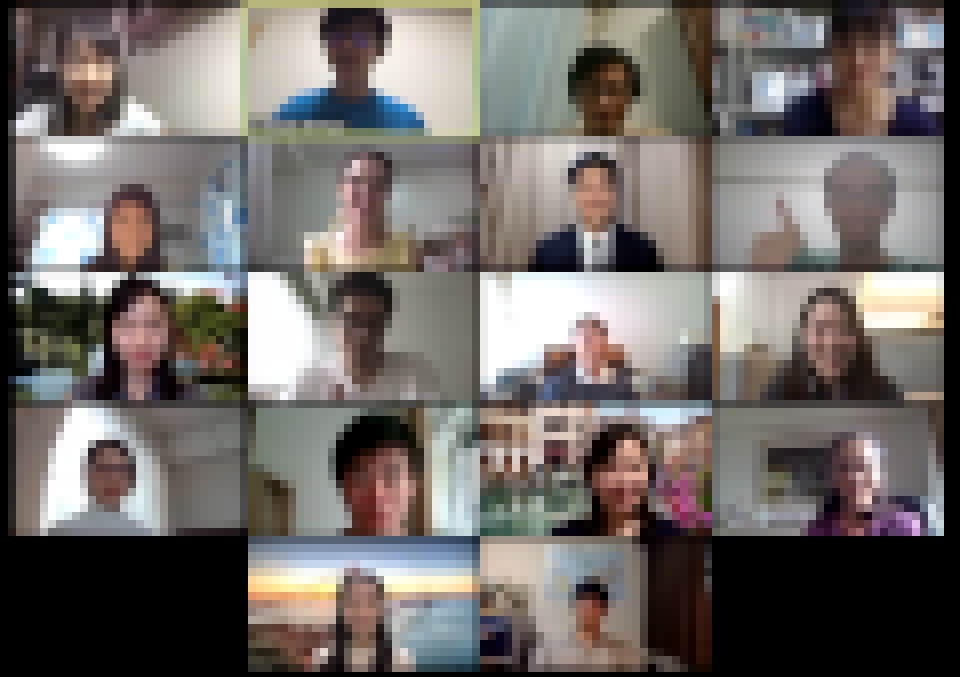- HOME
- Activities
- Forum List
- Forum Details
July.18.2020 KIP Forum "Impact of COVID-19 on Australia-Japan tourism"
Ms. Sarah Strugnell, The Australian National University, The University of Tokyo, Graduate School of Public Policy, Master 2nd year

July forum (Reading English Articles) was held online on July 18, inviting Ms. Sarah Strugnell, a Master student at The Australian National University and The University of Tokyo. Based on two articles which focus on the impact of COVID-19 on Australia-Japan tourism, she briefly explained the tourism industry in those two countries and compared the different tone of articles. Afterward, participants discussed how COVID-19 changes the images of Australia and Japan by using the concept of "soft power."
Ms. Sarah Strugnell
Bachelor of Arts (Honours) in Japanese Studies, Monash University Bachelor of Science in Microbiology, Monash University Master of Public Policy - Double Masters Degree Program (The Australian National University and the University of Tokyo)
Speech summary
July forum was held as a kick-off of a new KIP program, which is Reading English Articles. REA is a program where participants read an English magazine with a native speaker and discuss issues related to the guest speaker’s country and the world. This time, we invited Ms. Sarah Strugnell and discussed the impact of COVID-19 on Australia-Japan tourism based on two articles: "Japan’s Campaign to Revive Virus-Hit Tourism Sector Postponed Amid Cost Controversy," in "The Diplomat" and "Tour de force cancellations," in "The Monthly," an Australian publication.
First of all, Ms. Strugnell gave us a short presentation about the issues discussed in the two articles and the features of Australia-Japan tourism. The first article in "The Diplomat" argues how easily misinformation can be spread out through social media and impact people’s perceptions and views. In light of the COVID-19 pandemic, the misinformation caused many people to believe that the Japanese government would cover 50 percent of inbound travel costs to Japan. The second article in "The Monthly" sheds light on Australia’s major tourist spots focusing on local livelihoods of people working in tourism. Ms. Strugnell explained that due to the difference of targets and focuses, the tone of voice that these two articles adopt is very different – the first article uses formal written form, whereas the second one uses Australian slang. She also emphasized that there are frequent coming and goings between Australia and Japan, such as travel during cherry blossom and sport events seasons, working holiday, school trips, business trips, and noted that the low-cost carriers played vital roles in enabling them. In the second half of her presentation, Ms. Stregnell insisted on the importance of offering consistent messages by the government in the case of emergency, taking how the leaders of New Zealand and Australia coped with the COVID-19 crisis as an example. Finally, she proposed to support SMEs and purchase local items to minimize the negative impacts of COVID-19 on the tourism industry.
After the presentation, we moved on to the Q&A session. It covered various topics such as traveling in the Olympics year, the role of low-cost carriers, and the impression of online classes during the exchange in Japan. Ms. Strugnell talked that one of the reasons she decided to stay in Japan amid the COVID-19 pandemic was the inclusive healthcare system of Japan. She pointed out that living environments such as health security and food security play an important role in deciding when to stay or study. Besides, although she could receive Japanese news in English thanks to the great effort of her university, many foreign residents in Japan found difficulty in getting accurate information in English and sometimes have a misunderstanding due to incorrect translation, according to Ms. Strugnell.
In the latter half of REM, we discussed how COVID-19 changes images of Australia and Japan by being split into two groups. One group presented that safety is the top priority for travelers amid the pandemic; therefore, contact confirming application should be promoted, and the mainstream target will shift from group tour to personal tour. Another group insisted that even though safety should be prioritized, human-to-human interaction remains to be a key element of traveling. Although we cannot promote it during the epidemic, offering messages such as "we are welcoming you" is important because we, as human beings, always seek attachment and look for opportunities to immerse ourselves in different stories and cultures.
As a conclusion, Ms. Strugnell recommended to read not only the major magazine such as NewYorker but also national or local magazine to expand our horizons. The first REA was a fantastic opportunity to consider about the impact of COVID-19 on tourism and the bilateral relationship between Australia and Japan. We would like to express our sincere gratitude to Ms. Strugnell for sharing a valuable story with KIP members.
(Luka Ishino, The University of Tokyo, Graduate School of Public Policy, Master 1st year)


